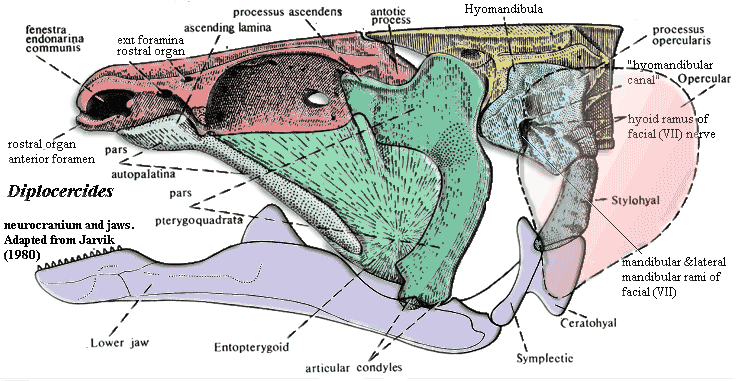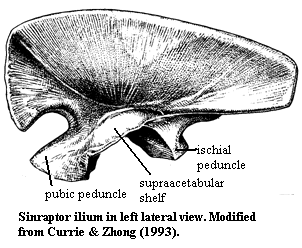
| Palaeos: |  |
Glossary |
| The Vertebrates | Pt-PZ |
| Page Back | Unit Back | Unit Home | Unit Dendrogram | Unit References | Glossary | Taxon Index |
| Page Next | Unit Next | Vertebrates Home | Vertebrate Dendrograms | Vertebrate References | Bones | Time |
For most phrases beginning with directional words, e.g. "posterior," "dorsal," "external," etc., or some generic anatomical terms, e.g., "vena," look under the next word in the phrase. However, note that this convention is not used with complete consistency in this Glossary.
Pterygiophore: the cartilage or bone on the outer end of which sit the median fin rays or spines and to which are attached erector and depressor fin muscles. There may be three cartilages that ossify into proximal, median and distal pterygiophores (or axonost, mesonost and baseost or epibaseost). The distal pterygiophore is the one next to the fin. When there are only two pterygiophores these are termed proximal and distal. In some fishes the proximal pterygiophore is very elongate and is known as a basal. Basals may be elongate enough to reach and fuse with the vertebrae, e.g. in Hippocampus. Proximal pterygiophores of the dorsal fin are also called interneurals and of the anal fin interhaemals. The last dorsal fin pterygiophore is named a stay. Vestigial pterygiophores anterior to the dorsal fin are called predorsals (or supraneurals although these are derived from neural spines). Same as fin basals.
 Pterygoid:
In tetrapods, the pterygoid is a complex, but relatively stable, paired palatal
bone with a number of parts. For the following discussion, it may be best
to refer to the images of tetrapod palates at, for example Ornithosuchus,
Therapsida, or Palatines.
In many tetrapods, it is the largest palatal bone and serves as the main
structural support. Most typically, the pterygoids meet extensively on the
mid-line of the palate and jointly send a process, the palatal ramus,
anteriorly, which may cover the parasphenoid more or less completely.
Sometimes this term is used to include the main body of the pterygoid as
well. More variably, there are one or two anterolateral processes which go
by various names, such as ectopterygoid ramus. In many
amniotes, the pterygoid develops a strong transverse process or transverse
flange which forms a bar running laterally across the palate. The pterygoid
also articulates with (where present) the dorsoventral supports for the palate:
the epipterygoid (dorsal) and the basipterygoid process of the braincase.
Finally, the pterygoid sends a long, robust quadrate ramus with complex
curvature down (posteroventrally) to grasp the quadrate and support the jaw
articulation.
Pterygoid:
In tetrapods, the pterygoid is a complex, but relatively stable, paired palatal
bone with a number of parts. For the following discussion, it may be best
to refer to the images of tetrapod palates at, for example Ornithosuchus,
Therapsida, or Palatines.
In many tetrapods, it is the largest palatal bone and serves as the main
structural support. Most typically, the pterygoids meet extensively on the
mid-line of the palate and jointly send a process, the palatal ramus,
anteriorly, which may cover the parasphenoid more or less completely.
Sometimes this term is used to include the main body of the pterygoid as
well. More variably, there are one or two anterolateral processes which go
by various names, such as ectopterygoid ramus. In many
amniotes, the pterygoid develops a strong transverse process or transverse
flange which forms a bar running laterally across the palate. The pterygoid
also articulates with (where present) the dorsoventral supports for the palate:
the epipterygoid (dorsal) and the basipterygoid process of the braincase.
Finally, the pterygoid sends a long, robust quadrate ramus with complex
curvature down (posteroventrally) to grasp the quadrate and support the jaw
articulation.
Basally, in fishes, the terminology tends to be a little different. Refer to the image of the Frasnian actinistian Diplocercides. The pterygoid bone of tetrapods is, roughly speaking, derived from the middle, entopterygoid (see also entry at entopterygoid for alternative definitions) portion of the palatoquadrate complex. The entopterygoid is not actually a part of the palatoquadrate. It is a dermal bone which has replaced the middle section of the primitively continuous endochondral bone of the palatoquadrate, the original upper jaw. In tetrapods, the pterygoid advances further, and also replaces the central part of the posterior, pterygoquadrate unit. This becomes the quadrate ramus. The upper part of this unit, the portion involved in the dorsal and basipterygoid articulations between jaw and braincase, is referred to as the metapterygoid. In tetrapods, most of this region is incorporated into the pterygoid as well, with the exception of the ascending process of the palatoquadrate, which becomes the epipterygoid.
Since the anterior braincase articulation is lost in tetrapods, the only remaining sections of the palatoquadrate are the epipterygoid and the quadrate (or, in mammals, the incus). Everything else is either lost or is replaced by the pterygoid.
 Pterygoid
fossa: apparently an ambiguous term. In mammals, the medial
pterygoideus muscle originates between the pterygoid plates of the palate and
attaches on the medial face of the jaw near the angle of the dentary. Both ends are
sometimes referred to as the "pterygoid fossa". For our
purposes, it is generally the fossa on the mandible that counts.
Pterygoid
fossa: apparently an ambiguous term. In mammals, the medial
pterygoideus muscle originates between the pterygoid plates of the palate and
attaches on the medial face of the jaw near the angle of the dentary. Both ends are
sometimes referred to as the "pterygoid fossa". For our
purposes, it is generally the fossa on the mandible that counts.
Pterygoid shelf: See Pterygoid fossa. The pterygoid shelf is the lip on the bottom of the fossa. This runs along the bottom of the jaw and may extend onto the condyloid process, reaching the dentary condyle in some cases.
Pterygoid transverse flange: see transverse flange
Pterygoquadrate: the posterior portion of the palatoquadrate, containing the epipterygoid, articular, and everything in between (usually replaced by the quadrate ramus of the pterygoid). See pterygoid for better explanation..
Pterylae: the tracts along the skin of a bird embryo along which feather primordia develop.
Pubic apron: the plate-like surface formed by the pubic symphysis.
Pubic pedicle: same as pubic peduncle.
 Pubic
peduncle: (of ilium) in lateral or medial view, the ilium of tetrapods
often appears to have two "legs" which form, on their interior
surfaces, two sides of the acetabulum. The anterior leg, which joins with the
pubis, is the pubic peduncle. The posterior leg, which joins with the
ischium, is the ischial peduncle. See Figure.
Pubic
peduncle: (of ilium) in lateral or medial view, the ilium of tetrapods
often appears to have two "legs" which form, on their interior
surfaces, two sides of the acetabulum. The anterior leg, which joins with the
pubis, is the pubic peduncle. The posterior leg, which joins with the
ischium, is the ischial peduncle. See Figure.
Pubic symphysis: Midventral plane of contact between the two halves of the pelvic girdle.
Pubis: the anteroventral member of the three bones forming the pelvis. See figure at antitrochanter.
Pubo-ischio-femoralis externus: see PIFE.
Puboischiofemoralis externus: see PIFE.
Pygostyle: the fused caudal vertebrae of a bird that support the tail feathers.
Pyriform: [1] generally, pear-shaped. [2] In brain anatomy, a particular lobe in the brain ("pyriform lobe") which includes the lateral olfactory gyrus, and areas of the anterior parahippocampal gyrus. These correspond to the primary and secondary olfactory areas of cortex. [3] In Insectivora, the piriform fenestra is a gap between the squamosal and alisphenoid, on one side, and the petrosal on the other. See, e.g., image at Apternodontidae. Sometimes spelled "piriform," q.v.
| Page Back | Unit Home | Page Top | Page Next |
checked ATW060208